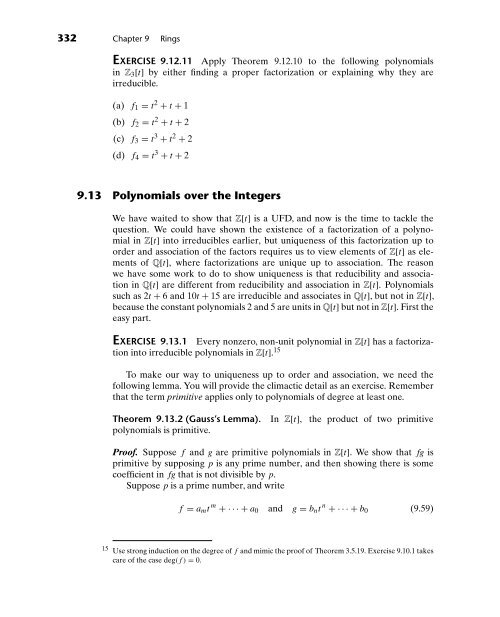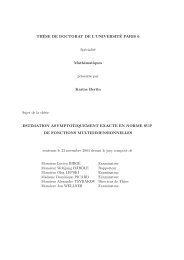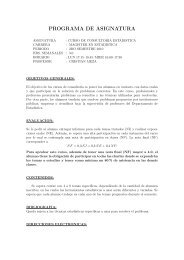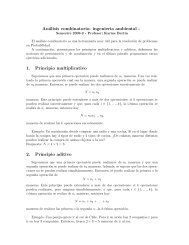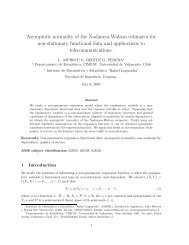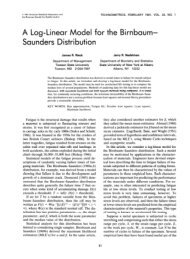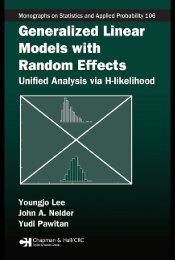- Page 2 and 3:
A Transition to Abstract Mathematic
- Page 4 and 5:
A Transition to Abstract Mathematic
- Page 6 and 7:
For Topo my little mouse
- Page 8 and 9:
Contents Why Read This Book? xiii P
- Page 10 and 11:
3.10 Irrational Numbers 107 3.11 Re
- Page 12 and 13:
8.2 Subgroups 252 8.2.1 Subgroups D
- Page 14 and 15:
Why Read This Book? One of Euclid
- Page 16 and 17:
Preface A Transition to Abstract Ma
- Page 18 and 19:
Preface to the First Edition This t
- Page 20 and 21:
Preface to the First Edition xix ea
- Page 22 and 23:
Acknowledgments It takes an entire
- Page 24 and 25:
Notation and Assumptions 0 Suppose
- Page 26 and 27:
0.2 Assumptions about the Real Numb
- Page 28 and 29:
0.2 Assumptions about the Real Numb
- Page 30 and 31:
0.2.3 Other Assumptions 0.2 Assumpt
- Page 32 and 33:
P A R T I Foundations of Logic and
- Page 34 and 35:
Language and Mathematics 1 One main
- Page 36 and 37:
1.1 Introduction to Logic 13 Now im
- Page 38 and 39:
The compound statement we call “p
- Page 40 and 41:
1.1 Introduction to Logic 17 exampl
- Page 42 and 43:
1.2 If-Then Statements 19 Definitio
- Page 44 and 45:
1.2 If-Then Statements 21 (h) The o
- Page 46 and 47:
1.2 If-Then Statements 23 (g) If ei
- Page 48 and 49:
p : Meghan is at least 25 years old
- Page 50 and 51:
1.3 Universal and Existential Quant
- Page 52 and 53:
1.3 Universal and Existential Quant
- Page 54 and 55:
1.3 Universal and Existential Quant
- Page 56 and 57:
1.4 Negations of Statements 33 2. F
- Page 58 and 59:
1.4 Negations of Statements 35 want
- Page 60 and 61:
Solution 1.4 Negations of Statement
- Page 62 and 63:
Solution 1. Everyone in this class
- Page 64 and 65:
1.5 How We Write Proofs 41 Our purp
- Page 66 and 67:
1.5 How We Write Proofs 43 the nega
- Page 68 and 69:
Properties of Real Numbers 2 It’s
- Page 70 and 71:
2.1 Basic Algebraic Properties of R
- Page 72 and 73:
2.1.2 Properties of Multiplication
- Page 74 and 75:
2.2 Ordering Properties of the Real
- Page 76 and 77:
(c) For all real numbers a, a2 ≥
- Page 78 and 79:
2.3 Absolute Value 55 (⇐) Now sup
- Page 80 and 81:
2.4 The Division Algorithm 57 mn =
- Page 82 and 83:
2.5 Divisibility and Prime Numbers
- Page 84 and 85:
2.5 Divisibility and Prime Numbers
- Page 86 and 87:
Sets and Their Properties 3 All of
- Page 88 and 89:
U A B Figure 3.5 Venn diagram illus
- Page 90 and 91:
(f) For all sets A, B, and C,ifA
- Page 92 and 93:
3.2 Proving Basic Set Properties 69
- Page 94 and 95:
3.3 Families of Sets 71 Notice that
- Page 96 and 97:
Example 3.3.2 Consider the family o
- Page 98 and 99:
3.3 Families of Sets 75 x ∈ � A
- Page 100 and 101:
3.3 Families of Sets 77 and ... and
- Page 102 and 103:
Example 3.4.2 For any positive inte
- Page 104 and 105:
3.4 The Principle of Mathematical I
- Page 106 and 107:
Proof. To clean up the notation, we
- Page 108 and 109:
3.5 Variations of the PMI 85 EXERCI
- Page 110 and 111:
(g) (a −m ) −n = a mn (h) (ab)
- Page 112 and 113:
Strong Induction 3.5 Variations of
- Page 114 and 115:
3.6 Equivalence Relations 91 EXERCI
- Page 116 and 117:
3.6 Equivalence Relations 93 beginn
- Page 118 and 119:
3.6 Equivalence Relations 95 constr
- Page 120 and 121:
3.7 Equivalence Classes and Partiti
- Page 122 and 123:
3.7 Equivalence Classes and Partiti
- Page 124 and 125:
3.7 Equivalence Classes and Partiti
- Page 126 and 127:
3.8 Building the Rational Numbers 1
- Page 128 and 129:
3.8 Building the Rational Numbers 1
- Page 130 and 131:
3.10 Irrational Numbers 107 EXERCIS
- Page 132 and 133:
3.10 Irrational Numbers 109 To the
- Page 134 and 135:
EXERCISE 3.10.2 √ 2 is irrational
- Page 136 and 137:
(a) {(x, y) : x ≤ y} (b) {(x, y)
- Page 138 and 139:
3.11 Relations in General 115 (O3)
- Page 140 and 141:
3.11 Relations in General 117 at al
- Page 142 and 143:
Functions 4 Second only to sets, fu
- Page 144 and 145:
4.1 Definition and Examples 121 pro
- Page 146 and 147:
Solution We show that T satisfies p
- Page 148 and 149:
4.2 One-to-one and Onto Functions 4
- Page 150 and 151:
4.2 One-to-one and Onto Functions 1
- Page 152 and 153:
A 1 x A B f (A 1 ) Figure 4.4 The i
- Page 154 and 155:
4.4 Composition and Inverse Functio
- Page 156 and 157:
4.4 Composition and Inverse Functio
- Page 158 and 159:
4.5 Three Helpful Theorems 135 The
- Page 160 and 161:
4.6 Finite Sets 137 EXERCISE 4.5.3
- Page 162 and 163:
4.7 Infinite Sets 139 The next exer
- Page 164 and 165:
4.7 Infinite Sets 141 of A. This or
- Page 166 and 167:
4.7 Infinite Sets 143 EXERCISE 4.7.
- Page 168 and 169:
EXERCISE 4.8.3 If A1,A2, and B are
- Page 170 and 171:
4.8 Cartesian Products and Cardinal
- Page 172 and 173:
4.8 Cartesian Products and Cardinal
- Page 174 and 175:
4.9 Combinations and Partitions 151
- Page 176 and 177:
4.9 Combinations and Partitions 153
- Page 178 and 179:
4.9 Combinations and Partitions 155
- Page 180 and 181:
4.10 The Binomial Theorem 157 EXERC
- Page 182 and 183:
EXERCISE 4.10.3 Determine the follo
- Page 184 and 185:
(c) The coefficient of ab 3 c 2 in
- Page 186 and 187:
P A R T I I Basic Principles of Ana
- Page 188 and 189:
The Real Numbers 5 Let’s look at
- Page 190 and 191:
5.1 The Least Upper Bound Axiom 167
- Page 192 and 193:
5.2 The Archimedean Property 169 EX
- Page 194 and 195:
5.2 The Archimedean Property 171 No
- Page 196 and 197:
5.3 Open and Closed Sets 173 Thus A
- Page 198 and 199:
5.4 Interior, Exterior, Boundary, a
- Page 200 and 201:
5.4 Interior, Exterior, Boundary, a
- Page 202 and 203:
5.5 Closure of Sets 179 The constru
- Page 204 and 205:
5.6 Compactness 181 EXERCISE 5.6.3
- Page 206 and 207:
5.6 Compactness 183 EXERCISE 5.6.13
- Page 208 and 209:
Sequences of Real Numbers 6.1 Seque
- Page 210 and 211:
6.1 Sequences Defined 187 Example 6
- Page 212 and 213:
EXERCISE 6.1.15 Consider the sequen
- Page 214 and 215:
L 1 e L L 2 e . . . . . . 1 2 3 4 N
- Page 216 and 217:
6.2 Convergence of Sequences 193 EX
- Page 218 and 219:
6.2 Convergence of Sequences 195 To
- Page 220 and 221:
6.3 The Nested Interval Property 19
- Page 222 and 223:
6.3 The Nested Interval Property 19
- Page 224 and 225:
6.3 The Nested Interval Property 20
- Page 226 and 227:
a1 a4 aN 1 2 aN aN 1 1 aN 1 3 a5 a3
- Page 228 and 229:
Example 6.4.7 The terms a0 = 1 a1 =
- Page 230 and 231:
Functions of a Real Variable 7 Func
- Page 232 and 233:
7.1 Bounded and Monotone Functions
- Page 234 and 235:
50 40 30 20 7 1 ε 7 7 2 ε 0 ( ( F
- Page 236 and 237:
7.2 Limits and Their Basic Properti
- Page 238 and 239:
7.2 Limits and Their Basic Properti
- Page 240 and 241:
7.3 More on Limits 217 values of 0
- Page 242 and 243:
7.4 Limits Involving Infinity 219 W
- Page 244 and 245:
7.4 Limits Involving Infinity 221 T
- Page 246 and 247:
(a) limx→a f(x) =−∞ (b) limx
- Page 248 and 249:
7.5 Continuity 225 If f is not cont
- Page 250 and 251:
1 2 3 4 5 6 Figure 7.6 Some example
- Page 252 and 253:
|a − x| |xa| = |x − a| |x||a| 7
- Page 254 and 255:
7.6 Implications of Continuity 231
- Page 256 and 257:
7.6 Implications of Continuity 233
- Page 258 and 259:
7.7 Uniform Continuity 235 we decla
- Page 260 and 261:
7.7 Uniform Continuity 237 Next, le
- Page 262 and 263:
7.7.2 Uniform Continuity and Compac
- Page 264 and 265:
P A R T I I I Basic Principles of A
- Page 266 and 267:
Groups 8 In its simplest terms, alg
- Page 268 and 269:
8.1 Introduction to Groups 245 are
- Page 270 and 271:
8.1 Introduction to Groups 247 Defi
- Page 272 and 273:
◦ 0 1 2 3 4 5 0 0 1 2 3 4 5 1 1 0
- Page 274 and 275:
Show that C × is an abelian group
- Page 276 and 277:
8.2 Subgroups 253 G1 and G3 are aut
- Page 278 and 279:
8.2 Subgroups 255 Notice how proper
- Page 280 and 281:
8.2 Subgroups 257 Example 8.2.15 su
- Page 282 and 283:
EXERCISE 8.2.23 If G is a group and
- Page 284 and 285:
8.3 Quotient Groups 261 [0] ={...,
- Page 286 and 287:
8.3 Quotient Groups 263 is standard
- Page 288 and 289:
Step 2: Define an operation ∗H on
- Page 290 and 291:
(iii) (Z + 3.8) +Z (Z + 1.2) (iv)
- Page 292 and 293:
then for a given f ∈ S and any a
- Page 294 and 295:
Thus f 2 = f ◦ f = (132)(56) ◦
- Page 296 and 297:
2 3 1 3 1 Figure 8.1 Rigid square u
- Page 298 and 299:
EXERCISE 8.4.12 Complete Table 8.64
- Page 300 and 301:
8.5 Normal Subgroups 277 Theorem 8.
- Page 302 and 303:
8.5 Normal Subgroups 279 point to b
- Page 304 and 305: 8.6 Group Morphisms 281 EXERCISE 8.
- Page 306 and 307: 8.6 Group Morphisms 283 Notice that
- Page 308 and 309: Ker � e x 2 x maps to x Ker � G
- Page 310 and 311: Rings 9 We can create algebraic str
- Page 312 and 313: 9.1 Rings and Fields 289 (R9) Multi
- Page 314 and 315: 9.1 Rings and Fields 291 we define
- Page 316 and 317: 9.2 Subrings 293 In addition to pro
- Page 318 and 319: 9.2 Subrings 295 p1 = q1 = 3. Verif
- Page 320 and 321: 9.3 Ring Properties 297 Theorem 9.3
- Page 322 and 323: 9.3 Ring Properties 299 EXERCISE 9.
- Page 324 and 325: 9.4 Ring Extensions 301 in the inte
- Page 326 and 327: 9.4 Ring Extensions 303 Example 9.4
- Page 328 and 329: 9.4 Ring Extensions 305 We insist t
- Page 330 and 331: 9.5 Ideals 307 An ideal, say a left
- Page 332 and 333: 9.6 Generated Ideals 309 Proof. Sup
- Page 334 and 335: EXERCISE 9.6.6 In the integers, wha
- Page 336 and 337: 9.7 Prime and Maximal Ideals 313 Ev
- Page 338 and 339: 9.8 Integral Domains 315 EXERCISE 9
- Page 340 and 341: 9.8 Integral Domains 317 Corollary
- Page 342 and 343: 9.9 Unique Factorization Domains 31
- Page 344 and 345: 9.10 Principal Ideal Domains 321 al
- Page 346 and 347: 9.10 Principal Ideal Domains 323 So
- Page 348 and 349: 9.11 Euclidean Domains 325 next exe
- Page 350 and 351: 9.11 Euclidean Domains 327 Exercise
- Page 352 and 353: Proof. Let f and g be nonzero polyn
- Page 356 and 357: 9.13 Polynomials over the Integers
- Page 358 and 359: 9.14 Ring Morphisms 335 Example 9.1
- Page 360 and 361: 9.14 Ring Morphisms 337 EXERCISE 9.
- Page 362 and 363: 9.15 Quotient Rings 339 this, howev
- Page 364 and 365: 9.15 Quotient Rings 341 Because the
- Page 366 and 367: 9.15 Quotient Rings 343 However, th
- Page 368 and 369: Index =,51 ɛ (epsilon), 167-168 ɛ
- Page 370 and 371: Index 347 Cosets, 263, 264, 265 Lag
- Page 372 and 373: Index 349 Gauchy sequences, 202-206
- Page 374 and 375: Index 351 identity, 124 relations v
- Page 376 and 377: Index 353 Quaternions, 248, 253, 25
- Page 378 and 379: Index 355 Tower of Hanoi, 84 Transc


